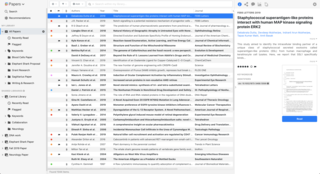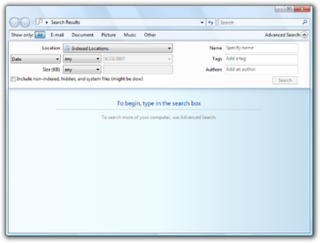This page is a glossary of library and information science.

File Explorer, previously known as Windows Explorer, is a file manager application that is included with releases of the Microsoft Windows operating system from Windows 95 onwards. It provides a graphical user interface for accessing the file systems. It is also the component of the operating system that presents many user interface items on the screen such as the taskbar and desktop. Controlling the computer is possible without Windows Explorer running.
The online public access catalog, often abbreviated OPAC, and frequently synonymous with library catalog, is an online database of materials held by a library or group of libraries. Online catalogs progressed from analog card catalogs, and similarly enable searching the library's collection of books and other materials.

WinFS was the code name for a canceled data storage and management system project based on relational databases, developed by Microsoft and first demonstrated in 2003 as an advanced storage subsystem for the Microsoft Windows operating system, designed for persistence and management of structured, semi-structured and unstructured data.

Google Desktop was a computer program with desktop search capabilities, created by Google for Linux, Apple Mac OS X, and Microsoft Windows systems. It allowed text searches of a user's email messages, computer files, music, photos, chats, Web pages viewed, and the ability to display "Google Gadgets" on the user's desktop in a Sidebar.
Mozilla Firefox has features that allow it to be distinguished from other web browsers, such as Chrome and Internet Explorer.
Artstor is a nonprofit organization that builds and distributes the Digital Library, an online resource of more than 2 million images in the arts, architecture, humanities, and sciences, and Shared Shelf, a Web-based cataloging and image management software service that allows institutions to catalog, edit, store, and share local collections.
The Library of Congress Subject Headings (LCSH) comprise a thesaurus of subject headings, maintained by the United States Library of Congress, for use in bibliographic records. LC Subject Headings are an integral part of bibliographic control, which is the function by which libraries collect, organize, and disseminate documents. It was first published in 1898, a year after the publication of Library of Congress Classification (1897). The last print edition was published in 2016. Access to the continuously revised vocabulary is now available via subscription and free services.
The California Digital Library (CDL) was founded by the University of California in 1997. Under the leadership of then UC President Richard C. Atkinson, the CDL’s original mission was to forge a better system for scholarly information management and improved support for teaching and research. In collaboration with the ten University of California Libraries and other partners, CDL assembled one of the world's largest digital research libraries. CDL facilitates the licensing of online materials and develops shared services used throughout the UC system. Building on the foundations of the Melvyl Catalog, CDL has developed one of the largest online library catalogs in the country and works in partnership with the UC campuses to bring the treasures of California's libraries, museums, and cultural heritage organizations to the world. CDL continues to explore how services such as digital curation, scholarly publishing, archiving and preservation support research throughout the information lifecycle.
A bibliographic database is a database of bibliographic records, an organized digital collection of references to published literature, including journal and newspaper articles, conference proceedings, reports, government and legal publications, patents, books, etc. In contrast to library catalogue entries, a large proportion of the bibliographic records in bibliographic databases describe articles, conference papers, etc., rather than complete monographs, and they generally contain very rich subject descriptions in the form of keywords, subject classification terms, or abstracts.

Zotero is a free and open-source reference management software to manage bibliographic data and related research materials. Notable features include web browser integration, online syncing, generation of in-text citations, footnotes, and bibliographies, as well as integration with the word processors Microsoft Word, LibreOffice Writer, and Google Docs. It is produced by the Center for History and New Media at George Mason University.

BASE is a multi-disciplinary search engine to scholarly internet resources, created by Bielefeld University Library in Bielefeld, Germany. It is based on free and open-source software such as Apache Solr and VuFind. It harvests OAI metadata from institutional repositories and other academic digital libraries that implement the Open Archives Initiative Protocol for Metadata Harvesting (OAI-PMH), and then normalizes and indexes the data for searching. In addition to OAI metadata, the library indexes selected web sites and local data collections, all of which can be searched via a single search interface.

Papers is a reference management software for Mac OS X and Windows, used to manage bibliographies and references when writing essays and articles. It is primarily used to organize references and maintain a library of PDF documents and also provides a uniform interface for document repository searches, metadata editing, full screen reading and a variety of ways to import and export documents.

Windows Search is a content index desktop search platform by Microsoft introduced in Windows Vista as a replacement for both the previous Indexing Service of Windows 2000 and the optional MSN Desktop Search for Windows XP and Windows Server 2003, designed to facilitate local and remote queries for files and non-file items in compatible applications including Windows Explorer. It was developed after the postponement of WinFS and introduced to Windows constituents originally touted as benefits of that platform.
A digital library, also called an online library, an internet library, a digital repository, or a digital collection is an online database of digital objects that can include text, still images, audio, video, digital documents, or other digital media formats or a library accessible through the internet. Objects can consist of digitized content like print or photographs, as well as originally produced digital content like word processor files or social media posts. In addition to storing content, digital libraries provide means for organizing, searching, and retrieving the content contained in the collection.
Projekt Dyabola is a software for creating and browsing bibliographic data and image collections, specifically targeted to the humanities community. The program is built and maintained by the Biering & Brinkmann company of Germany, and access to a web version is available through subscription. The service is available in six languages.
Folksonomy is a classification system in which end users apply public tags to online items, typically to make those items easier for themselves or others to find later. Over time, this can give rise to a classification system based on those tags and how often they are applied or searched for, in contrast to a taxonomic classification designed by the owners of the content and specified when it is published. This practice is also known as collaborative tagging, social classification, social indexing, and social tagging. Folksonomy was originally "the result of personal free tagging of information [...] for one's own retrieval", but online sharing and interaction expanded it into collaborative forms. Social tagging is the application of tags in an open online environment where the tags of other users are available to others. Collaborative tagging is tagging performed by a group of users. This type of folksonomy is commonly used in cooperative and collaborative projects such as research, content repositories, and social bookmarking.

Trove is an Australian online library database aggregator and service which includes full text documents, digital images, bibliographic and holdings data of items which are not available digitally, and a free faceted-search engine as a discovery tool. The database includes archives, images, newspapers, official documents, archived websites, manuscripts and other types of data. Hosted by the National Library of Australia in partnership with content providers, including members of the National and State Libraries Australia, it is one of the most well-respected and accessed GLAM services in Australia, with over 70,000 daily users.
Blacklight is an open-source Ruby on Rails engine for creating search interfaces on top of Apache Solr indices. The software is used by libraries to create discovery layers or institutional repositories; by museums and archives to highlight digital collections; and by other information retrieval projects.
Discovery layer is a term for software used to search libraries. A library's discovery layer includes a search box that library users can type queries into, similar to a web search engine. In library science, this searching is called discovery. The results from discovery may include books and other print materials from the library's catalog, electronic resources such as e-journals or videos, and items stored in other libraries. The word "layer" indicates that the software is modular—it is front-end software, separable from an integrated library system (ILS).








